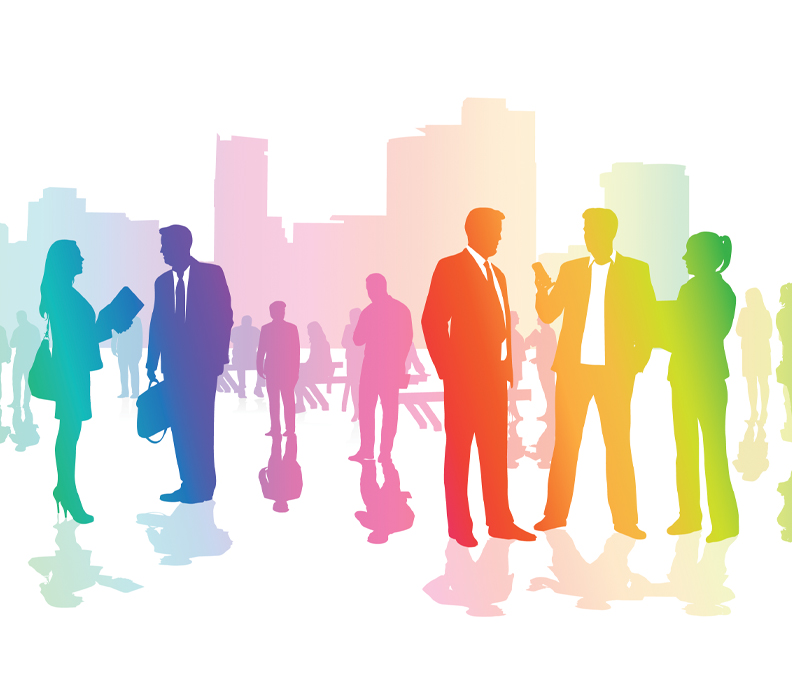These Innovative Companies Are Reinventing the Office
As employers grapple with hybrid work, shared coworking spaces are booming
by Boyd Farrow
December 8, 2022
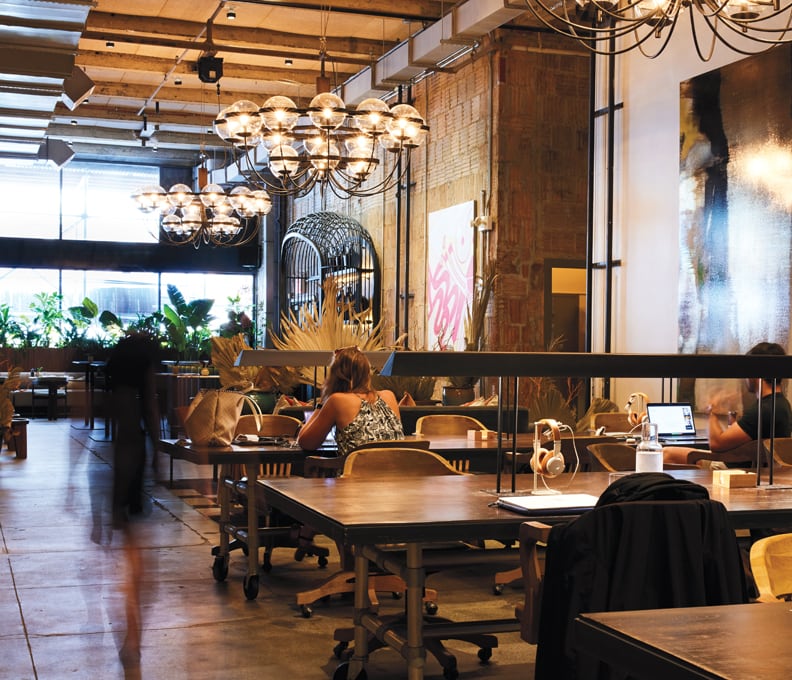
NeueHouse Madison Square, New York City / Photo: Courtesy of NeueHouse
If the idea of opening that spreadsheet inside a cubicle in a supermarket aisle doesn’t grab you, how about a pod in a train station, or courtside at your local sports arena? As more companies grapple with the concept of hybrid working, and an ever growing number of freelancers crave a place to connect with kindred spirits, shared coworking spaces are booming.
Unconventional Coworking Spaces Around the World
According to one report, the global market, valued at $12.3 billion in 2021, is expected to near $32 billion by 2027. In August, WeWork, the leading global flexible space provider, reported it had achieved 72 percent occupancy, its pre-pandemic level. Its rival IWG, meanwhile, whose clients include Microsoft, Cisco and Uber, has just announced it has added two million new American members over the past year—many in smaller towns charming remote workers. It plans another 1,000 locations over the next 12 months.
Across the Atlantic, IWG’s subsidiary Regus has been more innovative, creating workspaces inside the nationwide U.K. supermarket chain Tesco. (“Honey, can you pick up some milk before you leave the office?”) Wojo, a joint venture between French hotel giant Accor and real estate group Bouygues Immobilier, is far more ambitious. The company wants to put coworking spaces inside train stations, airports and shopping malls throughout France and beyond.
Last fall, the company even converted the iconic Parc des Princes soccer stadium—home to Paris Saint-Germain—into a giant coworking space for a week, to prove that most office workers can do their jobs from anywhere with basic infrastructure. The big question, though, is would they actually want to? Here, we look at four very different companies who all share the same vision: Better coworking spaces can only lead to a better world.
NeueHouse Madison Square
New York City
You may spot the odd plaid shirt or newsboy cap, but with its mid-century sofas, statement lighting and other MoMA-grade pieces, NeueHouse Madison Square seems more like a fashionable hotel than a shared working space spread over five floors in New York’s Flatiron District. Indeed, those collaborating over drinks at its plush, plant-filled bar are as carefully curated as their surroundings.
NeueHouse bills itself as a collection of private work and social spaces where those working in entertainment, arts and culture can mingle, further stimulated by the right blend of design and hospitality. “I don’t think our members consider us to be as generic as a coworking space,” says Jon Goss, chief brand officer. “We’re a beautifully designed home for leading creators and visionary companies to be part of a thought-leading community.”
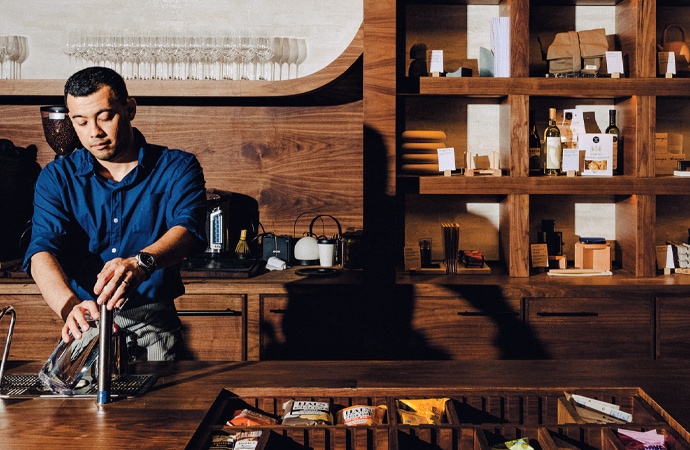
NeueHouse Madison Square / Photo: Jonah Rosenberg
In October, he notes, New York members could stow their MacBooks and catch Cody Keenan, Barack Obama’s chief White House speechwriter, in conversation with actor and writer Kal Penn, followed by an audience Q&A. The venue also hosted a recent gala event for Justice for Women, with performances by Chaka Khan and Doug E. Fresh. “We’re building a community that leading voices, both emerging and established, want to be a part of,” says Goss.
The pandemic has shifted many people’s attitude to the way they work, he says. “Now, they want to go where they feel safe, inspired and connected to others on their own flexible terms.”
And occasionally find business partners. New York-based singer/songwriter Katini Yamaoka—who calls NeueHouse “my second home, inspiration and community”—found backers for her recently launched skincare brand, Katini Skin, from among her fellow members. There are three tiers of membership, the most popular—and cheapest—charging $3,200 annually for access to private work and meeting spaces eight business days a month and unlimited admittance to restaurants, communal spaces and cultural programming across all properties.
As well as Madison Square, there are three other houses: Hollywood, which occupies the original CBS Studios; the Bradbury Building, one of Los Angeles’ historic landmarks; and Venice Beach, on Market Street. “All are in architecturally significant buildings, with inspiring legacies and personalities to match their locales,” says Goss. Venice, he notes, is designed for a particularly chill crowd. Coming up is Miami, and the first international outpost, in Stockholm.
NeueHouse members also get access to the company’s sibling enterprise, Fotografiska—a string of photography and culture hubs in Stockholm, New York, Tallinn and, opening next summer, Berlin. “There are many members clubs,” says Goss. “But we’re shaping the future of work, social connection and cultural experiences for the creative class.”
B. Amsterdam
Europe’s largest start-up ecosystem is like a 40,000-square-foot university campus with no pesky lectures to attend. Founded in 2014 to build bridges between creatives and business, it comprises three office blocks of airy open-plan coworking space and customized units housing approximately 320 start-ups. Helping to strike the right work/life balance is a bar, coffee shop, rooftop restaurant, huge gym and six indoor courts for playing padel, a tennis/squash hybrid that is immensely popular in the Netherlands.
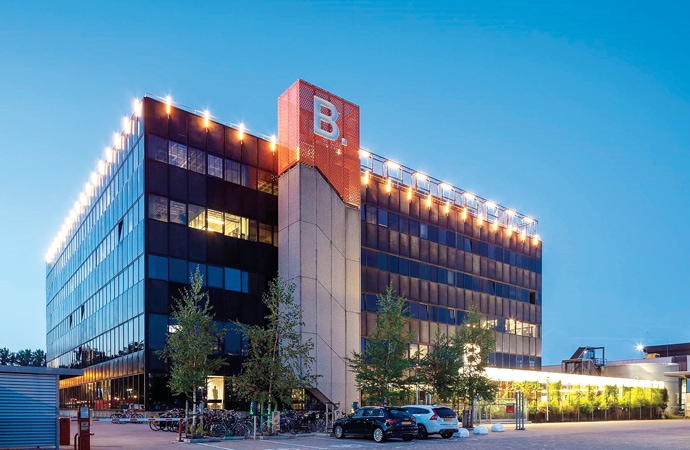
B. Amsterdam / Photo: Courtesy of B. Amsterdam
“You can never have enough beer or sport,” says Robin Slijkhuis, B.’s head of strategy and business development. “Entrepreneurs need a fun environment in order to innovate and disrupt. They are always more creative when they are inspired, and there is always something happening here.” B. places a particular emphasis on sporting activities, he explains, because it instills team spirit and also channels aggression. “You would not believe how competitive our padel league is,” he says.
Off court, though, B. is all about fostering business collaborations between members and cross-fertilizing ideas. Quicargo, an eco-friendly ride-sharing platform for the logistics sector, for instance, has linked up with several other B. start-ups, including Kugi—a fashionable new low-cal alcoholic drink made from organic juices and herbs. Grocery-delivery app Picnic, meanwhile, has turned the roof of one of B.’s premises into an urban farm and food lab. “It’s cool,” says Slijkhuis, “having beehives on top of a building that is essentially a giant beehive.”
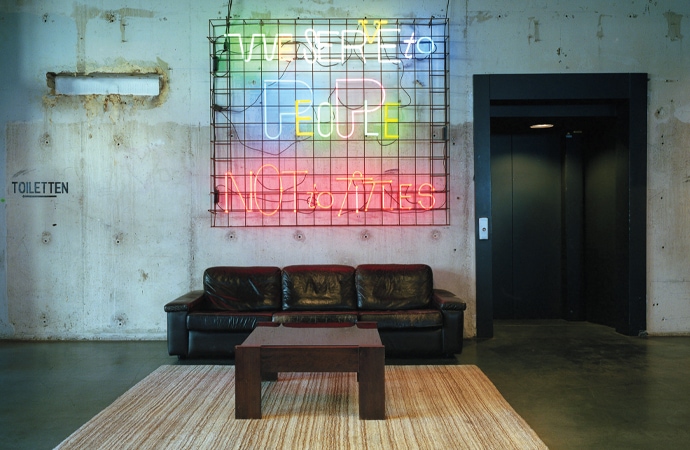
B. Amsterdam / Photo: Courtesy of B. Amsterdam
He says that Amsterdam was already experiencing a boom in multiuse urban spaces, but Covid really accelerated things. “During the pandemic many people realized that they didn’t like commuting. However, apartments are very expensive here and few people have home offices. At the same time, more people are freelancing or launching start-ups. Things just exploded.”
Individual membership starts at $92 for five days’ use of facilities a month and goes up to $259 for a fixed desk. Most of the members are in their 20s and 30s—a group for whom the line between work and play is increasingly fuzzy.
Soon B. will be offering this demographic the chance to rest, as well. The company’s next venture will be apartment complexes—possibly called B. at Home—which will offer short-term living accommodations. The first block is set to launch next year in Amsterdam, with the second likely to follow in Rotterdam before a gradual rollout to other European cities. All apartment complexes will have access to coworking spaces, event spaces, gyms—and, of course, padel courts.
Trellis
San Francisco
Although the unfortunately named Covo, a shared workspace in San Francisco’s eclectic Mission District, was an early victim of the pandemic, it has bounced back as Trellis—so named, says co-founder Rebecca Pan, because it aims to be a “support system for growth in the post-Covid world.” With its proximity to Y Combinator, one of Silicon Valley’s most prominent start-up incubators, and the convention complex Moscone Center, Trellis primarily focuses on those working in tech. Yet as a mission-driven community hub—“our entire team is either female, queer or a person of color,” says Pan—there is also outreach to nonprofits, minority groups and social enterprises. The three-level building—a mix of exposed brick, beams and ducts and directional lighting—provides units for 40 companies who pay between $275 and $4,480 depending on membership type and number of employees, plus private offices, dedicated desks and open seating for more than 100 monthly members. There is also a buzzy café and taproom, which hosts evening events. “Even our most industrious members round off a busy day unwinding during our happy hour,” says Pan.
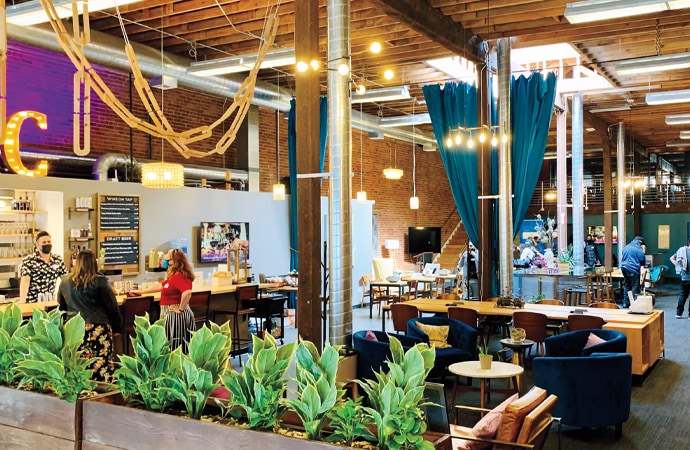
Trellis San Francisco / Photo: Courtesy of Trellis
Trellis also rents desk space by the hour for $5. “For that you get coffee, phone booths, plugs, printing and really fast Internet—in all, it’s a much better value than working out of a Starbucks,” says Pan. This attracts many walk-ins such as students and freelancers, some of whom go on to make more of a commitment.
“The line between work and play is very blurry for many people these days, and a lot of the time, they just want somewhere welcoming and safe to hang out for a few hours a week” says Pan. Nevertheless, she notes, several Trellis member companies have found this convivial space the perfect place to meet potential hires. Thunkable, for instance, a fast-growing start-up that provides “no-code” tools to app developers, has found some of its longest serving staff over Trellis’ craft beers and artisanal pizzas. Others have found artists and volunteers for various community projects.
Trellis even caters to those who don’t actually need a physical workspace. Virtual members get the benefit of a prestigious San Francisco address and phone number, as well as a “virtual assistant” who can process emails and scan or print documents.
“Things are going so well, we’re now getting ready to scale,” says Pan. “We have a great team and are looking for franchise partners to take what we’ve done to new areas. Initially this would be in San Francisco, and then hopefully farther afield.”
Makerversity
London
Somerset House, the neoclassical London landmark on the Strand, hosts the U.K.’s largest creative community, working across art, culture and technology. Yet few visitors see the subterranean maze of studios, workshops, labs and offices that comprise Makerversity, a unique coworking space for approximately 300 product designers, materials researchers, computer coders, engineers and more.
“We support professional ‘makers’, which means anyone who is in the business of making for a living,” says general manager Charlotte Gilks. “It could be an entrepreneur, inventor, craftsperson or technician. It could be a start-up or design team. Basically, if someone needs a space to create in with machines and tools, this is the place for them.”
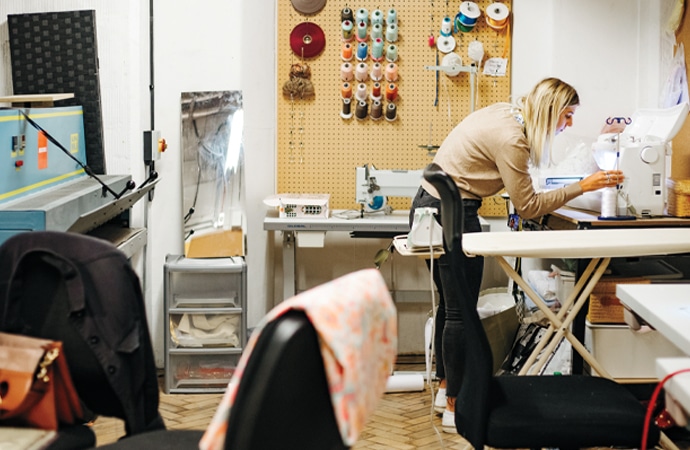
Makerversity, London / Photo: Monwar Hussain
This support, she explains, includes equipment, an inexpensive workspace and a comprehensive and far-reaching business ecosystem of mentors, technical experts and industry investors. There is also a lounge with coffee and bagels.
Apart from a typical raw coworking space—albeit one with cutting boards and piles of wood instead of laptops—the sprawling campus contains several specialist workshops. One, for digital production and fabrication, has a range of 3D printers and electronics equipment, plus a large laser cutter. The engineering room has a computer-aided mill, lathe and an array of presses, grinders and cutters. There is also a textile studio, assembly space and podcast studio.
A number of the makers, says Gilks, are developing solutions for the world’s biggest societal challenges, including climate change, health and inequality. Current tenants include The Tyre Collective, which uses electrostatics to collect charged particles flying off car tires and into our lungs; Scarlett Yang, who has created a glasslike substance from algae extract and silk cocoon protein that can decompose in water within 24 hours; and Amphibio, a start-up that has developed the first artificial gill that will enable humans to breathe underwater for longer periods.
Fees start at $292 a month for a roaming membership and go up to $3,503 for a studio for up to eight people who might want to build something large. Space is limited, and applicants essentially have to audition. Most members stay for six to nine months.
There is also an under-25 membership, which is free for three months, and a residency, Makers With a Mission, which supports extraordinary ideas and newbies pushing a social or environmental agenda or using disruptive technologies and manufacturing processes. This is free for six months.
“The coolest thing is that members have 24-hour access to the space,” Gilks says. “It may be a little spooky in this ancient building at night, but you never know when creativity may strike.”


